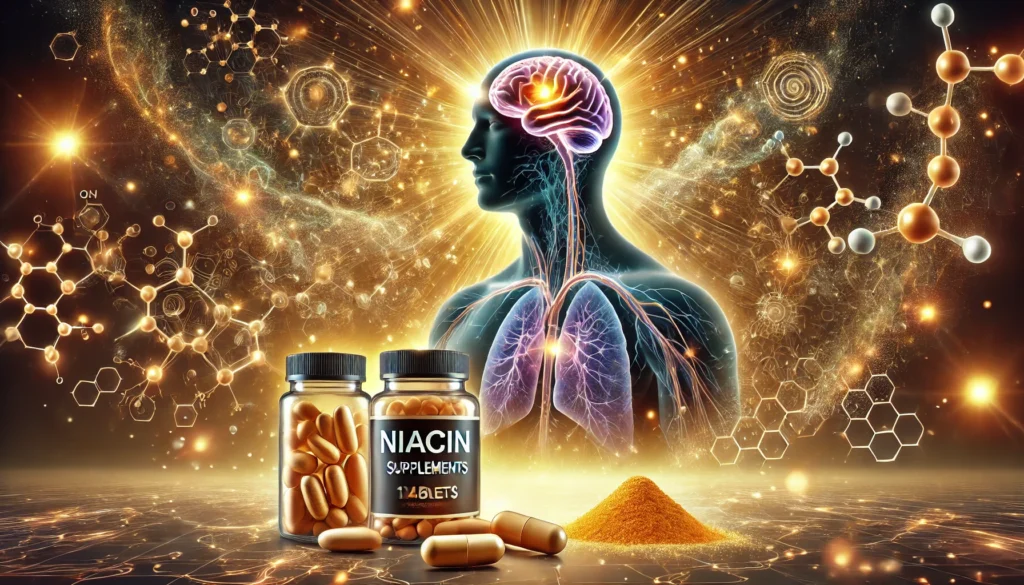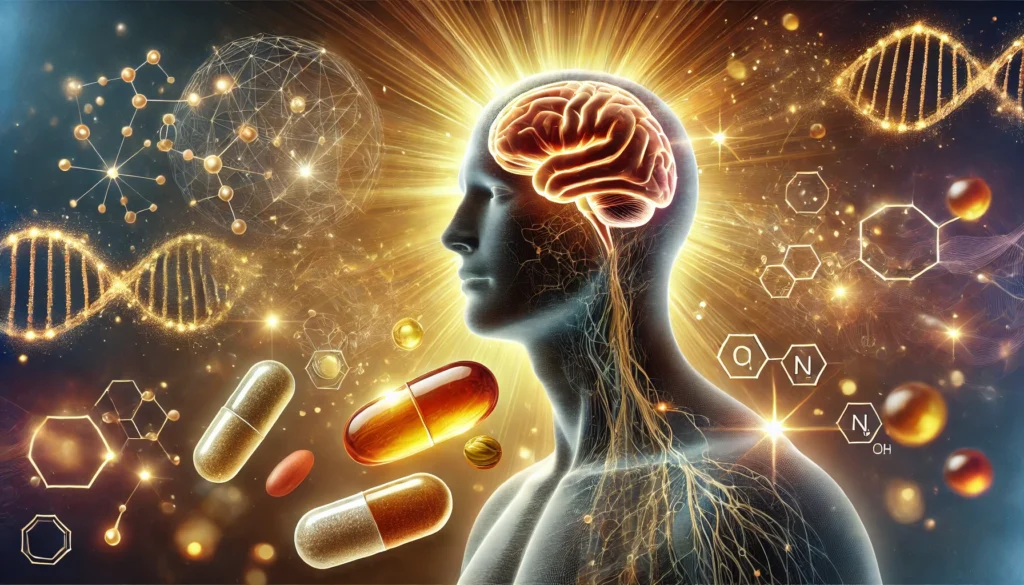Niacin, also known as vitamin B3, is an essential water-soluble vitamin that plays a pivotal role in many biological processes, including energy production, DNA repair, and cell signaling. Known for its role in cardiovascular health and lipid management, niacin has recently attracted interest as a nootropic due to its potential cognitive benefits. This article explores the scientific basis of niacin’s nootropic potential, examining its chemistry, physiological mechanisms, dosage, side effects, interactions, and considerations for safe supplementation.
You May Also Like:
Sources of Niacin
Niacin is found in a variety of foods, with high concentrations in animal-based sources and fortified grains. Notable sources include:
- Animal-Based Foods: Liver, fish (especially tuna and salmon), chicken, and red meat are rich in niacin.
- Plant-Based Foods: Peanuts, brown rice, and whole grains provide significant niacin for vegetarians and vegans.
- Fortified Foods: Many cereals and bread products are fortified with niacin to help individuals meet their daily requirements.
While most people obtain sufficient niacin through diet, certain populations may benefit from supplementation, particularly those with dietary restrictions or specific health needs.

Chemistry of Niacin
Niacin exists in two primary forms: nicotinic acid and niacinamide (nicotinamide). Both forms are precursors to NAD+ (nicotinamide adenine dinucleotide), a coenzyme essential for cellular energy metabolism and DNA repair. NAD+ functions as a redox molecule, shuttling electrons in metabolic reactions to facilitate ATP (adenosine triphosphate) production. This energy generation is crucial for sustaining cellular health, especially in tissues with high metabolic demands, such as the brain.
The molecular structures of nicotinic acid and niacinamide differ slightly, which affects their biological effects and clinical uses. For instance, nicotinic acid is known to cause vasodilation, leading to a “flushing” sensation, whereas niacinamide lacks this effect. Both forms support brain health, although their mechanisms vary slightly in terms of therapeutic applications.
Physiological Mechanisms of Niacin in the Body and Brain
Niacin is integral to cellular respiration and ATP production, two functions that are highly relevant to brain health. By increasing NAD+ availability, niacin supports mitochondrial efficiency, which is critical for neurons’ high energy requirements. NAD+ also plays a role in sirtuin activation, a family of proteins involved in cellular repair and stress resistance.
The antioxidant properties of niacin are especially valuable in the brain, where oxidative stress significantly contributes to neurodegenerative diseases like Alzheimer’s and Parkinson’s. Niacin enhances antioxidant defenses by supporting glutathione synthesis, which helps neutralize reactive oxygen species (ROS) and protect neurons from oxidative damage.
Moreover, niacin affects neurotransmitter production by participating in the synthesis of serotonin, a key mood-regulating hormone. This relationship with serotonin production highlights niacin’s potential role in managing mood and cognitive health, particularly in individuals with mild niacin deficiencies.
Boost cognitive performance and improve skin vitality with Niacin supplements—Shop Today on Amazon!

Nootropic Benefits of Niacin
The exploration of niacin as a nootropic has gained momentum due to its significant role in brain energy metabolism, neuroprotection, neurotransmitter synthesis, and mental resilience. Although more research is needed, niacin demonstrates potential in these cognitive areas:
- Enhanced Brain Energy Metabolism: Niacin’s critical role in NAD+ production supports mitochondrial ATP synthesis, the energy powerhouse for brain cells. Research indicates that individuals with higher NAD+ levels may experience improved mental clarity, sharper focus, and resilience against mental fatigue, making niacin beneficial for sustained cognitive performance.
- Antioxidant and Neuroprotective Effects: Niacin possesses potent antioxidant properties that help protect brain cells from oxidative stress, a major factor in cognitive decline and neurodegeneration. By supporting glutathione and other antioxidants, niacin shields neurons, contributing to healthier memory, learning, and overall cognitive vitality.
- Mood Regulation and Cognitive Clarity: Niacin’s influence on serotonin synthesis may aid in stabilizing mood and enhancing mental clarity. Low niacin levels have been linked to depression, anxiety, and brain fog, and supplementation may alleviate these symptoms by supporting balanced neurotransmitter function.
- Potential for Cognitive Recovery: Emerging research suggests that niacin may facilitate brain function recovery after injury by promoting neural repair and angiogenesis (the formation of new blood vessels). This neuroprotective property indicates potential benefits for patients recovering from traumatic brain injuries or strokes.
- Memory Support: By promoting blood flow and energy production in the brain, niacin may aid in preserving memory function. Regular intake of niacin has been associated with better memory retention, particularly in older adults experiencing natural cognitive decline.
- Stress Resilience: Niacin plays a role in modulating cortisol and stress response. Research suggests that it may alleviate the effects of chronic stress on cognitive function, enhancing mental endurance and stress resilience—key factors for excelling in high-demand cognitive tasks.
- Enhanced Neuroplasticity: Some studies suggest that niacin may contribute to neuroplasticity, the brain’s ability to reorganize itself by forming new neural connections. This adaptation process is essential for learning, memory, and recovery from neurological conditions, making niacin an intriguing candidate for brain health and adaptability.

Dosage and Supplementation Guidelines
The Recommended Dietary Allowance (RDA) for niacin varies based on age, sex, and health status. For adults, the RDA is 16 mg for men and 14 mg for women. However, for therapeutic or nootropic purposes, higher doses may be used.
- General Cognitive Enhancement Dosage: For cognitive support, doses ranging from 50–200 mg per day may suffice to support brain energy and mental focus. Since niacin is water-soluble, excess amounts are typically excreted, reducing the risk of toxicity.
- High-Dose Niacin Therapy: For cholesterol management and other therapeutic applications, dosages ranging from 500–2,000 mg per day may be prescribed. Such doses should only be taken under medical supervision due to an increased risk of side effects, including liver toxicity.
- Supplement Forms: Niacin supplements are available in immediate-release (IR), sustained-release (SR), and extended-release (ER) formulations. Immediate-release forms may cause flushing, while sustained- and extended-release versions reduce this side effect but increase the risk of liver strain.
It is important to start with a low dose and gradually increase it to assess tolerance, particularly when using high-dose niacin for therapeutic purposes.

Side Effects and Safety
Niacin is generally safe when taken within recommended dosages, but it can cause side effects at higher doses.
- Flushing: One of the most common side effects of niacin, particularly at high doses, is flushing—a warming sensation accompanied by redness of the skin. This effect is harmless but can be uncomfortable.
- Liver Toxicity: High doses of niacin, particularly sustained-release formulations, may lead to liver toxicity. Regular monitoring of liver enzymes is advised for individuals taking niacin at doses exceeding 500 mg per day.
- Gastrointestinal Discomfort: Some users may experience stomach upset, nausea, or indigestion, particularly with immediate-release forms of niacin.
- Hyperuricemia and Gout: Niacin can increase uric acid levels, potentially triggering gout attacks in susceptible individuals.
Interactions with Other Supplements and Medications
Niacin may interact with various medications and supplements, affecting their efficacy and potential side effects.
- Cholesterol-Lowering Medications: Combining niacin with statins may enhance lipid-lowering effects but also increases the risk of muscle damage (myopathy). Patients on statins should consult with their healthcare provider before adding niacin to their regimen.
- Blood Pressure Medications: Niacin’s vasodilatory effects may interact with antihypertensive drugs, potentially causing excessive drops in blood pressure. Monitoring is recommended for individuals on blood pressure medications.
- Aspirin: Taking aspirin about 30 minutes before niacin can reduce flushing by inhibiting the release of prostaglandins. This combination may be useful for individuals sensitive to niacin flushing.
- Antioxidant Supplements: High doses of niacin may interfere with other antioxidants, particularly if taken in large quantities. Balancing niacin with vitamins C and E is generally safe, but high doses of all three should be avoided unless under medical supervision.
Risks for Individuals with Certain Health Conditions
Niacin may pose additional risks for individuals with specific health conditions:
- Liver Disease: Since niacin is metabolized in the liver, individuals with liver disease should avoid high-dose niacin to prevent worsening liver function.
- Kidney Disease: Niacin may accumulate in individuals with impaired kidney function, increasing the risk of toxicity. Monitoring by a healthcare provider is advised.
- Diabetes: Niacin can affect blood glucose levels, potentially causing hyperglycemia in people with diabetes. Individuals with diabetes should monitor their blood sugar levels closely when taking niacin supplements.
- Peptic Ulcers: Niacin may exacerbate ulcer symptoms due to its effect on stomach acidity. Those with active ulcers should consult a physician before starting niacin.
Support neural communication and enhance the body’s energy production with Niacin—Buy Now on Amazon!

Conclusion: Is Niacin Worth Considering as a Nootropic?
Niacin’s central role in energy metabolism, antioxidant defense, and neurotransmitter synthesis makes it a valuable nutrient for supporting brain health. Although research on niacin’s specific cognitive-enhancing effects is still emerging, evidence supports its use for boosting energy, protecting against oxidative stress, and promoting mental clarity. However, high-dose niacin should be approached cautiously and ideally under the guidance of a healthcare provider due to the potential risks of liver toxicity, blood glucose fluctuations, and interactions with other medications.
In sum, niacin offers promising benefits for mental health and cognitive function. By maintaining adequate niacin levels through diet or supplementation, individuals can support brain energy, protect against oxidative damage, and potentially improve mood and focus. Nonetheless, those considering niacin as a nootropic supplement should weigh the potential side effects and consult with a healthcare provider to ensure safe and effective use.

References:
- The discovery of niacin, biotin, and pantothenic acid. Retrieved from: https://pubmed.ncbi.nlm.nih.gov/23183297/
- Niacin to improve cholesterol numbers. Retrieved from: https://www.mayoclinic.org/diseases-conditions/high-blood-cholesterol/in-depth/niacin/art-20046208
- Niacin Fact Sheet for Health Professionals. Retrieved from: https://ods.od.nih.gov/factsheets/Niacin-HealthProfessional/
- Niacin in the Central Nervous System: An Update of Biological Aspects and Clinical Applications. Retrieved from: https://pmc.ncbi.nlm.nih.gov/articles/PMC6412771/
- What Does Niacin Do for The Body? 7 Benefits and 5 Side Effects. Retrieved from: https://www.medicinenet.com/what_does_niacin_do_7_benefits_and_5_side_effects/article.htm
Important Note: The information contained in this article is for general informational purposes only, and should not be construed as health or medical advice, nor is it intended to diagnose, prevent, treat, or cure any disease or health condition. Before embarking on any diet, fitness regimen, or program of nutritional supplementation, it is advisable to consult your healthcare professional in order to determine its safety and probable efficacy in terms of your individual state of health.
Regarding Nutritional Supplements Or Other Non-Prescription Health Products: If any nutritional supplements or other non-prescription health products are mentioned in the foregoing article, any claims or statements made about them have not been evaluated by the U.S. Food and Drug Administration, and such nutritional supplements or other health products are not intended to diagnose, treat, cure, or prevent any disease.


